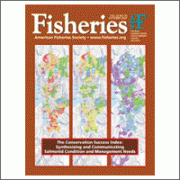Looking Beyond the Border: Advantages and Challenges of Moving Between Canada and the United States for Graduate Studies in Fisheries Science
AUTHOR(S): Caleb .T. Hasler, Michael R. Donaldson, Andrew J. Gingerich and Kyle C. Hanson
CITATION:
Hasler, C.T., M.R. Donaldson, A.J. Gingerich and K.C. Hanson. 2007. Looking beyond the border: Advantages and challenges of moving between Canada and the United States for graduate studies in fisheries science. Fisheries 32(10):502-503.
SUMMARY:
For university graduates who are considering postgraduate degrees in fisheries research, choosing a graduate path is often a difficult decision. Students must select a research topic, a potential supervisor, and a location that suit their interests and goals.
Consequently, aspiring graduate students tend to ignore international programs and instead look for domestic opportunities to simplify this difficult decision (i.e., many aspects of the domestic process are similar to the student’s undergraduate experience, assuming that the majority of students complete their undergraduate degrees at domestic institutions). In doing so, students limit their full range of options for graduate studies. The purpose of this article is to discuss graduate education opportunities in fisheries science in Canada and the United States, and to describe some of the issues that may influence students when they are making decisions about graduate schools. We submit that aspiring graduate students should consider all possible avenues for graduate studies, and should look beyond domestic institutions to find the graduate program that fits best. In practice, we advocate that students also consider institutions beyond Canada and the United States, but our experience is derived from our collective experience in these two countries.
FULL TEXT – Hasler et al.



